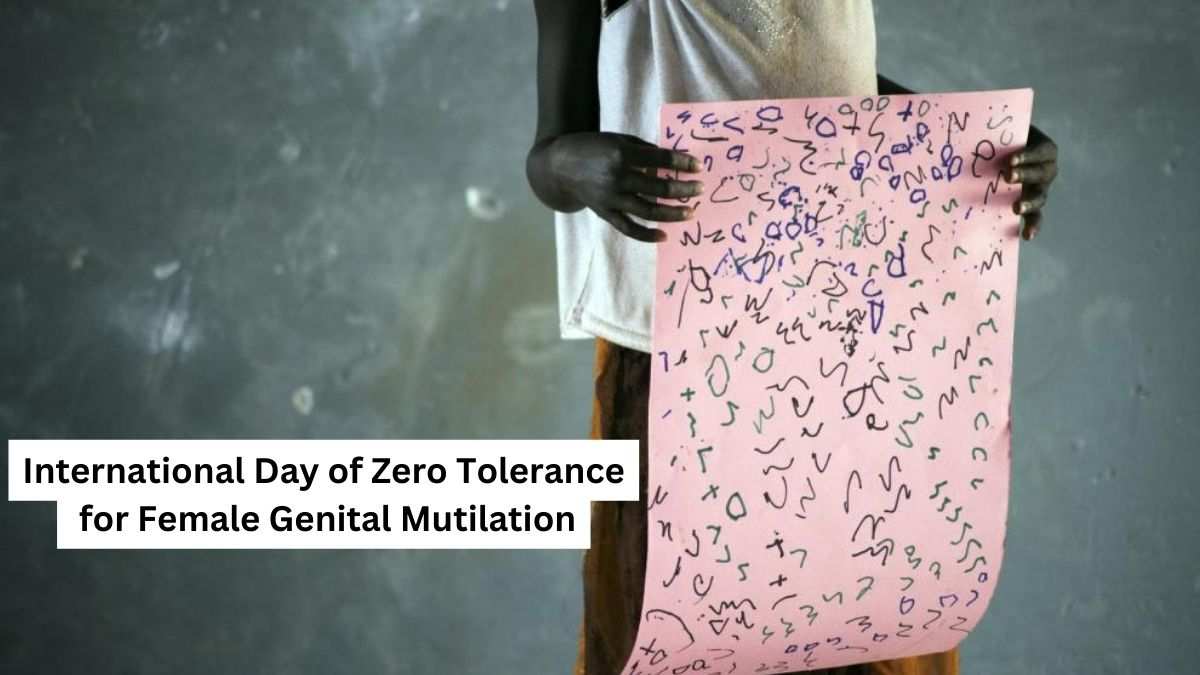
International Day of Zero Tolerance for Female Genital Mutilation 2023: Every year on February 6, a global day of action is celebrated to end female genital mutilation. The International Day of Zero Tolerance towards Female Genital Mutilation was established by the UN General Assembly to draw attention to this humanitarian crisis.
Today is International Day of Zero Tolerance for Female Genital Mutilation (FGM).
Female genital mutilation is an extreme form of discrimination against women, it violates #Human rightsand causes serious damage to health.
Should be prevented: #EndFGM!
👉 https://t.co/3patABwfva pic.twitter.com/4RFvTEW9XI
— World Health Organization (WHO) (@WHO)
February 6, 2023
Today is the International Day of Zero Tolerance for Female Genital Mutilation.
It is a time to lead change wherever we have influence, fund interventions, demand accountability and listen to the voices of girls and young women.
#EndFGM pic.twitter.com/KqV4u4Pviz
— UN Women (@UN_Women)
February 6, 2023
What is female genital mutilation?
Female genital mutilation, also known as female genital mutilation, female genital mutilation/cutting (FGM/C), and female circumcision, is the practice of ritually cutting or removing all or part of a woman’s external female genitalia. The devastating effects of female genital mutilation, which affects 200 million women worldwide, include severe pain, difficult births and even death.
FGM can have a negative impact on the sexual and reproductive health of women and girls. Genital mutilation exposes women to the risk of postpartum hemorrhage, risk of stillbirth, risk of obstruction of labor, and risk of HIV infection.
It has harmful and long-lasting psychological effects. Children’s behavioral problems, crippling anxiety, stress, and sexual dysfunction can be caused by residual trauma.
International Day of Zero Tolerance for Female Genital Mutilation: History
February 6 was designated as the International Day of Zero Tolerance towards Female Genital Mutilation by the United Nations General Assembly in 2012. The day aims to raise awareness and intensify efforts to end this practice around the world. . Female genital mutilation can end in a single generation, according to many compelling arguments.
Fear of social stigma is among the main motivating factors for this violent behavior. FGM is tolerated by social norms that are stratified and complex across geographic borders, making it difficult for individuals and change agents to address the problem on a global scale.
Theme of the International Day of Zero Tolerance for Female Genital Mutilation 2023 and everything you need to know
International Day of Zero Tolerance for Female Genital Mutilation: Importance
- This practice violates the bodies of girls and women as well as their right to health and safety, so the day raises awareness among women who fight for the fundamental right to control what happens with their bodies.
- The day recognizes the suffering of girls who have suffered unspeakable physical and emotional abuse as a result of female genital mutilation.
- The UN believes that these cycles can be broken in a single lifetime with a concerted international effort. Zero tolerance for female genital mutilation aims to end the ongoing suffering and harm caused by this practice.
How to celebrate the International Day of Zero Tolerance for Female Genital Mutilation?
- Educate people about the difficulties women and girls around the world face in achieving their human rights. For a broader audience, spread the word on various social media websites.
- Help agencies, nonprofits, and professionals in the field by providing assistance. If you can, donate money or tell others about your initiatives.
- Constructive debate is required to promote change regarding generational social and cultural conditioning regarding women’s bodies.
Zero Tolerance Day towards Female Genital Mutilation is celebrated not only for medical reasons but also as a way to denounce the threat of indirect misogyny against women. Every year on February 6, FGM is still observed, and the UN and other social activism groups will continue to make strong efforts to end FGM by 2030.
Check other important days and dates in February 2023
Categories: Optical Illusion
Source: ptivs2.edu.vn